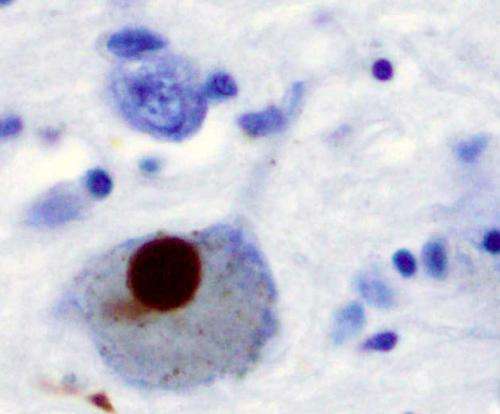Defective glial cells can push neurons toward Parkinson's disease

Researchers from the University of Barcelona have shown that defective versions of human brain cells called astrocytes are linked to the buildup of a toxic protein that is the hallmark of Parkinson's disease. The studied astrocytes, derived from Parkinson's disease patients with a genetic mutation that affects cell clean-up functions, caused more accumulation of the toxin, alpha-synuclein, than those derived from healthy individuals. The work, which appears January 10 in the journal Stem Cell Reports, suggests an important role for glial cells in Parkinson's disease and offers potential new targets for developing therapies.
"We have shown that astrocytes play a crucial role in Parkinson's disease. Our results demonstrate that Parkinson's disease astrocytes transfer a toxic protein to dopamine-producing neurons," says co-first author Angelique di Domenico, former postdoctoral fellow at the University of Barcelona's Bellvitge Biomedical Research Institute.
Star-shaped astrocytes extend branching tendrils around synapses and along blood vessels. One previous postmortem study found that Parkinson's patients had a buildup of alpha-synuclein—a protein that accumulates to form Lewy bodies, the signature pathology of Parkinson's disease—in their neurons as well as their astrocytes. It was this observation that led the researchers to examine astrocytes' role in the disease.
Using cells derived from Parkinson's patients with an LRRK2 mutation, the researchers generated stem-cell-derived glia cells. Fifteen percent of Parkinson's cases are tied to an inherited gene mutation, and 7 percent of all cases—inherited and sporadic—are linked to a large protein complex called LRRK2. LRRK2's main function is still unknown, but it seems to play a role in mitochondrial dynamics and autophagy, a process through which cells break down and rebuild their damaged components.
The researchers then used CRISPR gene editing to track the toxic alpha-synuclein as it was generated by the stem-cell-derived astrocytes and transferred to dopamine-producing neurons.
"We found Parkinson's disease astrocytes to have fragmented mitochondria, as well as several disrupted cellular degradation pathways, leading to the accumulation of alpha-synuclein," di Domenico says.
The accumulation of alpha-synuclein caused the targeted neurons' projecting branches—axons and dendrites—to shorten and disintegrate, resulting in neuronal death, she says.
In contrast, when healthy astrocytes were cultured with neurons from Parkinson's disease patients, axons and dendrites regenerated and alpha-synuclein was prevented from accumulating, ultimately restoring neuronal function, she notes.
The researchers used a drug—developed to treat abnormal intracellular buildup of toxic materials—on the Parkinson's disease astrocytes. "We were elated to see after treatment that the cellular degradation processes were restored and alpha-synuclein was completely cleared from the Parkinson's disease astrocytes," di Domenico says. "These results pave the way to new therapeutic strategies that block pathogenic interactions between neurons and glial cells."
Next steps involve investigating astrocytes from the 85 to 90 percent of Parkinson's cases that are sporadic, with no known genetic cause.
More information: Stem Cell Reports, di Domenico et al.: "Patient-specific iPSC-derived astrocytes contribute to non-cell autonomous neurodegeneration in Parkinson's disease" www.cell.com/stem-cell-reports … 2213-6711(18)30530-7 , DOI: 10.1016/j.stemcr.2018.12.011



















